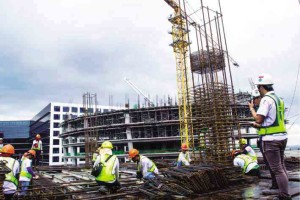The European Chamber of Commerce of the Philippines (ECCP) wants market forces in the retail industry to decide the entry of foreign firms without having to comply with any minimum threshold in paid-in capital, a top official said on Wednesday.
This is how it should be in an ideal market, according to ECCP President Guenter Taus. However, he also said that the chamber still thinks that the government’s plan to substantially lower the capital threshold for foreign companies that want to enter the local retail market is a “step to the right direction.”
Earlier this week, Socioeconomic Planning Secretary Ernesto M. Pernia said the 11th foreign investment negative list (FINL) would include the reduction of the minimum paid-up capital from the current threshold of $2.5 million to $200,000. The biennial list, which outlines the industries where foreign companies have limited participation, is expected to receive President Rodrigo Duterte’s approval within the year.
Foreign business and local companies have reacted differently to the announcement, with the latter expressing reservations regarding the move’s potential harm on local micro, small, and medium-sized enterprises (MSMEs) that may not be equipped to compete against foreign players.
The Retail Trade Liberalization Act of 2000 has reserved the minimum paid-up capital below $2.5 million exclusively to Filipino businesses, a form of protection which provides a space for MSMEs to grow in. Foreign players, on the other hand, were allowed to enter once their minimum paid-up capital exceeds that threshold.
However, Taus said that it is time that “we finally end this protectionism” that favors local MSMEs at the expense of having better competition, and thus better goods and services for Filipino consumers.
“That’s the crux of the matter. Isn’t competition what we want especially for ordinary Filipinos? I do not think that you need to put any amount there. I think (you should) let market forces develop as they go along but (the reduced threshold) is a step in the right direction,” the ECCP official said.
Also, Taus said the liberalization of the retail industry grows more important now that there is greater emphasis on the Association of Southeast Asian Nations (Asean), which means that greater effort must be exerted to make the Philippines outdo the offers being done by rival markets within the region.
“It would not only entice European MSMEs, it would send the right signals worldwide that the Philippines is open for business. The more Asean integration we see, the more competition there is, the more you have to market that the Philippines is their destination of choice,” he noted.
But the Philippine Retailers Association (PRA), which considers itself the pulse and voice of the local retail industry, does not share the same opinion as that of ECCP.
PRA Vice Chairman Roberto S. Claudio said that a more liberalized retail industry would come at the expense of local MSMEs, especially without steps being taken to make sure that domestic small players are as competitive as their foreign counterparts.
However, Taus said that the government should not intervene in behalf of local companies because it runs against the nature of competition.
“Why would the government concern itself with how companies compete in the market? That’s what the company should do. If you’re a responsible business owner, you have to fight competition,” he said. /kga


